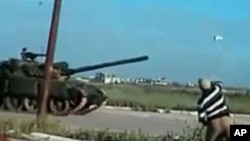May 3, 2011, the United Nations will mark World Press Freedom Day. This year’s event comes at a time when social media, mobile phones and the Internet are playing an increasing role in giving a voice to the oppressed. As recent events in the Middle East and North Africa have shown, so-called "citizen journalists" are playing a major role.
Syria
Street Protesters in Syria enraged over the deaths of pro-democracy activists are finding their way onto the Internet, even as the government continues a brutal crackdown. In one recent video, scores marched through the streets and then scatter, as the sound of gunfire fills the air.
Although amateur videos cannot be independently verified, social media and citizen journalists are helping rally protesters.
Adel Iskandar, a new media specialist at Georgetown University here in Washington, says they are also documenting protests against the injustices that individuals across the region say they have suffered for decades.
"They do have a journalistic responsibility, a huge journalistic responsibility in the case of Syria, where there are no journalists on the ground," said Iskandar. "This task is actually colossal because they are literally the world’s eyes and ears."
North Africa
Uprisings already have toppled governments in Egypt and Tunisia, and the outcome of mass protests elsewhere in the Mideast and North Africa remains to be seen.
Courtney Radsch of Freedom House, a U.S.-based human rights monitoring group, says mobile phones in the Arab world have become a powerful multimedia tool because most people have them.
"Simply by snapping a photo or recording a chant or taking a video of police brutality or opposition protests and then in many cases they are on the 3G networks, these more advanced networks, so they can upload video and photos directly, without having to go back to a computer, without risking their phone being confiscated," said Radsch.
Georgetown University's Adel Iskandar notes that much of the video and photos coming out of Syria and other countries in the region can be found on the social networking site Facebook, which has become a clearing house for information for online postings.
"So now Al Jazeera, Al Arabiya and other [television] networks are relying exclusively on content produced by citizen journalists in Syria, and have done the same in Bahrain and Egypt and elsewhere," he said.
Limitations
Although citizen journalists are playing a major role in dissemination information about events in these troubled countries, Courtney Radsch says it is unlikely that they will eventually replace traditional journalists.
"It’s not sustainable to rely on anonymous random citizens for coverage of mainstream politics, mainstream economic issues," she said. "They tend to focus on the fringes, on the issues that are not being covered by the mainstream media or holding the mainstream media to account."
Despite its power, there are limits to what social media and the Internet can do. During the uprisings in Egypt, for example, the government shut down the Internet.
In Tunisia, authorities reportedly hacked into the Facebook accounts of people believe to be behind the unrest. In Syria, authorities are believed to be clogging Twitter feeds with spam, such as postings with messages unrelated to the unrest.
Empowerment
Courtney Radsch of Freedom House says that although social networks can empower citizens by connecting activist networks and the international media, there is a downside.
"At the same time, because they are public, they are also susceptible to surveillance and to manipulation by governments," she said.
Although the Egyptian government’s shut down of the Internet was successful initially, it eventually was overpowered by protests in the streets.
"It is a serious decision to take and one [that governments] need to think about it in advance," said Adel Iskandar. "And in some cases, it backfires because the human will to express oneself once the ball is rolling, if you will, is so insatiable that there is really nothing you can do."
Analysts say that in addition to failing to stop the uprisings in Egypt, the government's shutdown of the Internet also cost Egypt an estimated $90 billion in international trade.

